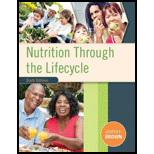
Nutrition Through the Life Cycle (MindTap Course List)
6th Edition
ISBN: 9781305628007
Author: Judith E. Brown
Publisher: Cengage Learning
expand_more
expand_more
format_list_bulleted
Concept explainers
Question
Chapter 4, Problem 7RQ
Summary Introduction
Introduction: Critical period in pregnancy is during 10-20 weeks of gestation when fetal organs begin to form. It is the time when rapid multiplication and differentiation of fetal cells occur. During this time once the fetal cells forms, it is very difficult to reprogram them. Therefore, during this time it is critical for the mother to maintain a healthy nutritional balance of the body because it can have long term effects on fetal development and growth.
Expert Solution & Answer
Trending nowThis is a popular solution!

Chapter 4 Solutions
Nutrition Through the Life Cycle (MindTap Course List)
Ch. 4 - Prob. 1.1CSCh. 4 - Prob. 1.2CSCh. 4 - Prob. 1.3CSCh. 4 - _______ Which of the following statements is...Ch. 4 - Prob. 2RQCh. 4 - Prob. 3RQCh. 4 - Prob. 4RQCh. 4 - Prob. 5RQCh. 4 - Prob. 6RQCh. 4 - Prob. 7RQ
Ch. 4 - Prob. 8RQCh. 4 - Prob. 9RQCh. 4 - Prob. 10RQCh. 4 - Prob. 11RQCh. 4 - Prob. 12RQCh. 4 - Prob. 13RQCh. 4 - Prob. 14RQCh. 4 - Prob. 15RQCh. 4 - Prob. 16RQCh. 4 - Prob. 17RQCh. 4 - Prob. 18RQCh. 4 - Prob. 19RQCh. 4 - Prob. 20RQCh. 4 - Prob. 21RQCh. 4 - Prob. 22RQCh. 4 - Prob. 23RQCh. 4 - Prob. 24RQCh. 4 - Prob. 25RQCh. 4 - Prob. 26RQCh. 4 - Prob. 27RQCh. 4 - Prob. 28RQCh. 4 - Prob. 29RQCh. 4 - Prob. 30RQCh. 4 - Prob. 31RQCh. 4 - Prob. 32RQCh. 4 - Prob. 33RQ
Knowledge Booster
Learn more about
Need a deep-dive on the concept behind this application? Look no further. Learn more about this topic, health-nutrition and related others by exploring similar questions and additional content below.Similar questions
- ________ Although the incidence of neural tube defects in the United States declined post-folic acid fortification, some women are still at risk. Which of the following options represents a risk group for inadequate folate status and a neural tube defect affected pregnancy? a. Non-Hispanic Black women b. Non-Hispanic White women c. Asian Americans d. Hispanic Americansarrow_forwardAfter hearing this information, should Sue and Tim feel that their chances of having a child with a cleft lip are increased over that of the general population? Sue and Tim were referred for genetic counseling after they inquired about the risk of having a child with a cleft lip. Tim was born with a mild cleft lip that was surgically repaired. He expressed concern that his future children could be at risk for a more severe form of clefting. Sue was in her 12th week of pregnancy, and both were anxious about the pregnancy because Sue had had a difficult time conceiving. The couple stated that they would not consider terminating the pregnancy for any reason but wanted to be prepared for the possibility of having a child with a birth defect. The genetic counselor took a three-generation family history from both Sue and Tim and found that Tim was the only person to have had a cleft lip. Sues family history showed no cases of cleft lip. Tim and Sue had several misconceptions about clefting, and the genetic counselor spent time explaining how cleft lips occur and some of the known causes of this birth defect. The following list summarizes the counselors discussion with the couple. Fathers, as well as mothers, can pass on genes that cause clefting. Some clefts are caused by environmental factors, meaning that the condition didnt come from the father or the mother. One child in 33 is born with some sort of birth defect. One in 700 is born with a cleft-related birth defect. Most clefts occur in boys; however, a girl can be born with a cleft. If a person (male or female) is born with a cleft, the chances of that person having a child with a cleft, given no other obvious factor, is 7 in 100. Some clefts are related to identifiable syndromes. Of those, some are autosomal dominant. A person with an autosomal dominant gene has a 50% probability of passing the gene to an offspring. Many clefts run in families even when there does not seem to be any identifiable syndrome present. Clefting seems to be related to ethnicity, occurring most often among Asians, Latinos, and Native Americans (1 : 500); next most often among persons of European ethnicity (1 : 700); and least often among persons of African origin (1 : 1,000). A cleft condition develops during the fourth to the eighth week of pregnancy. After that critical period, nothing the mother does can cause a cleft. Sometimes a cleft develops even before the mother is aware that she is pregnant. Women who smoke are twice as likely to give birth to a child with a cleft. Women who ingest large quantities of vitamin A or low quantities of folic acid are more likely to have children with a cleft. In about 70% of cases, the fetal face is clearly visible using ultrasound. Facial disorders have been detected at the 15th gestational week of pregnancy. Ultrasound can be precise and reliable in diagnosing fetal craniofacial conditions.arrow_forwardIf the child showed a cleft lip through ultrasound analysis and the parents then started blaming each other (because Sue is a smoker and Tim was born with the defect), how would you counsel them? Sue and Tim were referred for genetic counseling after they inquired about the risk of having a child with a cleft lip. Tim was born with a mild cleft lip that was surgically repaired. He expressed concern that his future children could be at risk for a more severe form of clefting. Sue was in her 12th week of pregnancy, and both were anxious about the pregnancy because Sue had had a difficult time conceiving. The couple stated that they would not consider terminating the pregnancy for any reason but wanted to be prepared for the possibility of having a child with a birth defect. The genetic counselor took a three-generation family history from both Sue and Tim and found that Tim was the only person to have had a cleft lip. Sues family history showed no cases of cleft lip. Tim and Sue had several misconceptions about clefting, and the genetic counselor spent time explaining how cleft lips occur and some of the known causes of this birth defect. The following list summarizes the counselors discussion with the couple. Fathers, as well as mothers, can pass on genes that cause clefting. Some clefts are caused by environmental factors, meaning that the condition didnt come from the father or the mother. One child in 33 is born with some sort of birth defect. One in 700 is born with a cleft-related birth defect. Most clefts occur in boys; however, a girl can be born with a cleft. If a person (male or female) is born with a cleft, the chances of that person having a child with a cleft, given no other obvious factor, is 7 in 100. Some clefts are related to identifiable syndromes. Of those, some are autosomal dominant. A person with an autosomal dominant gene has a 50% probability of passing the gene to an offspring. Many clefts run in families even when there does not seem to be any identifiable syndrome present. Clefting seems to be related to ethnicity, occurring most often among Asians, Latinos, and Native Americans (1 : 500); next most often among persons of European ethnicity (1 : 700); and least often among persons of African origin (1 : 1,000). A cleft condition develops during the fourth to the eighth week of pregnancy. After that critical period, nothing the mother does can cause a cleft. Sometimes a cleft develops even before the mother is aware that she is pregnant. Women who smoke are twice as likely to give birth to a child with a cleft. Women who ingest large quantities of vitamin A or low quantities of folic acid are more likely to have children with a cleft. In about 70% of cases, the fetal face is clearly visible using ultrasound. Facial disorders have been detected at the 15th gestational week of pregnancy. Ultrasound can be precise and reliable in diagnosing fetal craniofacial conditions.arrow_forward
- The term __________ refers to the entire lower area of the abdomen. inguinal umbilicusarrow_forwardList three common causes of persistent nipple pain.arrow_forwardFertility specialists may advise a couple who wish to conceive a child to use an alkaline (basic) douche immediately before intercourse. What might the reasoning behind this advice be?arrow_forward
arrow_back_ios
arrow_forward_ios
Recommended textbooks for you
 Medical Terminology for Health Professions, Spira...Health & NutritionISBN:9781305634350Author:Ann Ehrlich, Carol L. Schroeder, Laura Ehrlich, Katrina A. SchroederPublisher:Cengage Learning
Medical Terminology for Health Professions, Spira...Health & NutritionISBN:9781305634350Author:Ann Ehrlich, Carol L. Schroeder, Laura Ehrlich, Katrina A. SchroederPublisher:Cengage Learning Nutrition Through The Life CycleHealth & NutritionISBN:9781337919333Author:Brown, Judith E.Publisher:Cengage Learning,Essentials of Pharmacology for Health ProfessionsNursingISBN:9781305441620Author:WOODROWPublisher:Cengage
Nutrition Through The Life CycleHealth & NutritionISBN:9781337919333Author:Brown, Judith E.Publisher:Cengage Learning,Essentials of Pharmacology for Health ProfessionsNursingISBN:9781305441620Author:WOODROWPublisher:Cengage

Medical Terminology for Health Professions, Spira...
Health & Nutrition
ISBN:9781305634350
Author:Ann Ehrlich, Carol L. Schroeder, Laura Ehrlich, Katrina A. Schroeder
Publisher:Cengage Learning




Nutrition Through The Life Cycle
Health & Nutrition
ISBN:9781337919333
Author:Brown, Judith E.
Publisher:Cengage Learning,

Essentials of Pharmacology for Health Professions
Nursing
ISBN:9781305441620
Author:WOODROW
Publisher:Cengage